The link to my website portfolio is: mkproductionsportfolio.wordpress.com
Below are some screenshots of my website starting with the Home page:
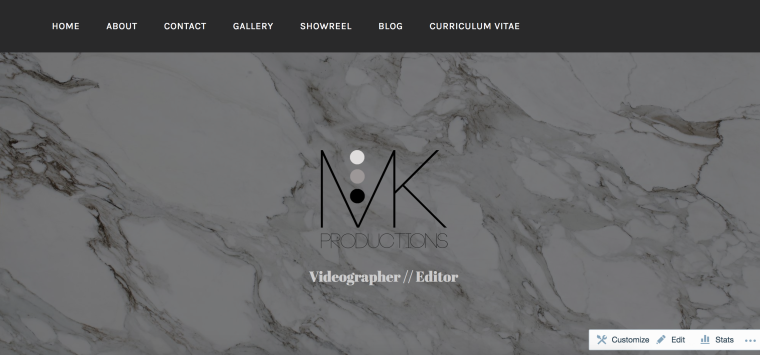
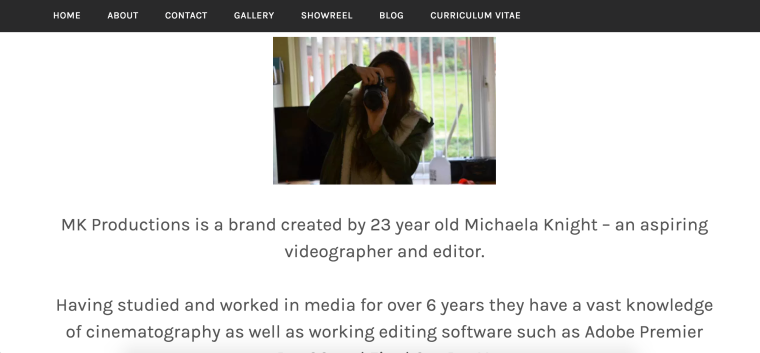

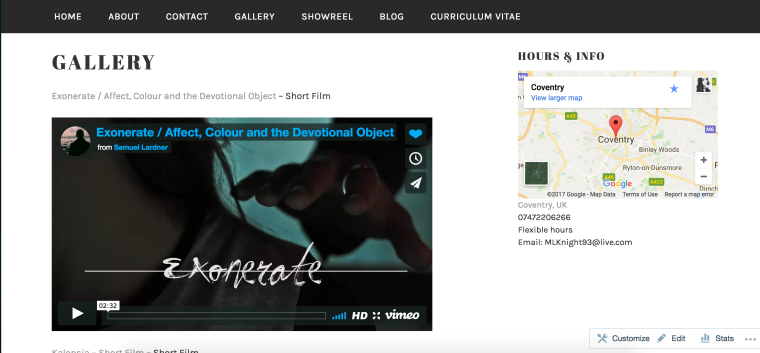
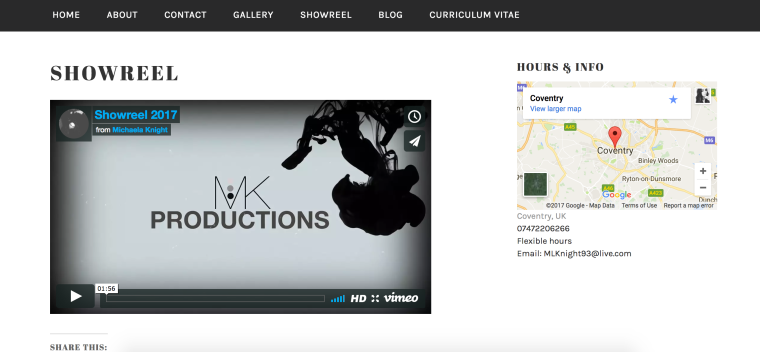
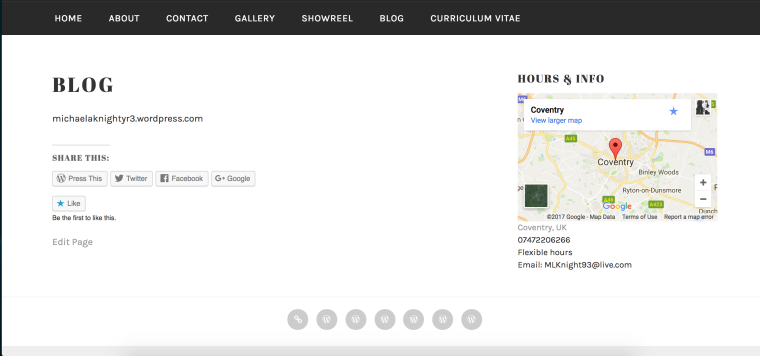
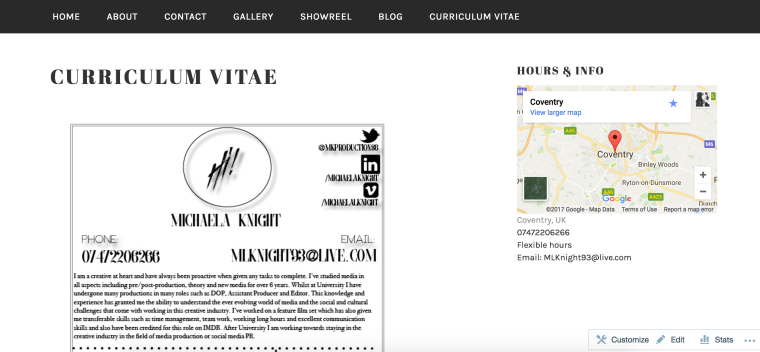
The link to my website portfolio is: mkproductionsportfolio.wordpress.com
Below are some screenshots of my website starting with the Home page:







All footage in this showreel can be found on my vimeo page which is linked below:
Showreel 2017 from Michaela Knight on Vimeo.
364MC Tutorial Preparation Document
| 1. Do you have a specific career in mind? If yes, what career?
If yes, what career? If no, what kind of careers are you considering? |
|
Yes, the career I’d like to pursue would be that of Cinematography/DOP or Sound Assistant
|
| 2. What research have you already carried out about this career?
List websites, books, primary research etc. and what you have found out. |
|
I’ve been emailing lots of professional DOP’s and Cinematographers, yet to hear responses, but from what I’ve researched it’s something you have to practice very well and volunteer to help shoot films, get your portfolio large enough for people to notice you. Also have an eye for detail and an imagination for creative shots.
|
| 3. How will your FMP further your career aims? |
|
My FMP is somewhat experimental; I want to have an exhibition over documentary and short. I want to address social media and body image in my exhibition with video pieces and some photography images. I got inspired at the Tate when I saw a piece by Marvin Gaye Chetwood where they placed multiple TV screens showcasing human bodies in a carnivalesque performance based on a TV detective program. I believe it will further my career as it’s different to short film and documentary and explores more than just one medium with photography in there was well.
|
| 4. Have you considered carrying out any work experience/placements during the year? If yes, what have you considered and how far down the line are you in arranging it? |
|
I would love the opportunity to gain some more experience as I’ve not been able to gain any recently but unfortunately that hasn’t happened yet.
|
| 5. Are you on the Media Production Professional Experience Facebook space? |
| I am not and I can’t seem to find the page to join.
|
| 6. Have you registered with Creative Futures? If not, you must do it immediately. |
|
Yes I have
|
| 7. Have you registered with Central Careers in the Hub? |
| I believe so
|
| 8. Have you had a one-to-one with them to discuss career options? |
| Not yet but will be planning to do so next week.
|
| 9. What portfolios have you seen/looked at and what techniques have you started to consider for your own portfolio? Provide URLs
|
| I’ve looked at examples online and professional portfolios on professional cinematographer websites to consider in my own portfolio.
|
| 10. What professionals have you isolated as being useful for you to contact?
Provide name, role, organization and why they will be useful to you
|
| I haven’t isolated any right now; I’ve just been emailing multiple contacts in hope of a reply.
|
| 11. What networks have you isolated as being useful for you to further your career? Provide URLs, when and where they meet/how they are accessed (if virtual networks) etc.
|
|
|
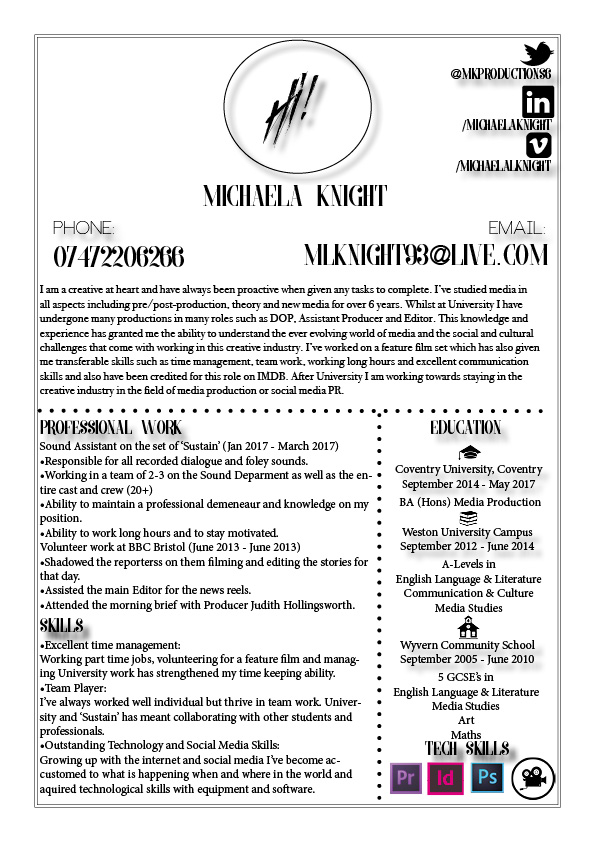
In my previous post about camera assistant research I concentrated on the roles available in this day and age, the requirements and how to gain experience and access to those opportunities.
Whilst doing that I came across a couple of freelance Videographers and their online portfolios showcasing their business and skills and decided it was worth documenting as this is something that would help me when creating my own portfolio. Below I’ve included some screenshots of the few that I came across and found appealing:
One of the first videographers I came across was Charlotte Armitage at charlottearmitage.com
I loved Charlotte’s website it was clean cut, and modern. The moving image behind each page (Portfolio, Contact etc) was very relevant and the shots were beautiful. She has a vast portfolio of experience without over loading the client with information – everything is laid out clearly. The contact page is also thorough with information or her details and how to contact her for bookings which is, obviously, essential when you’re a freelancer.
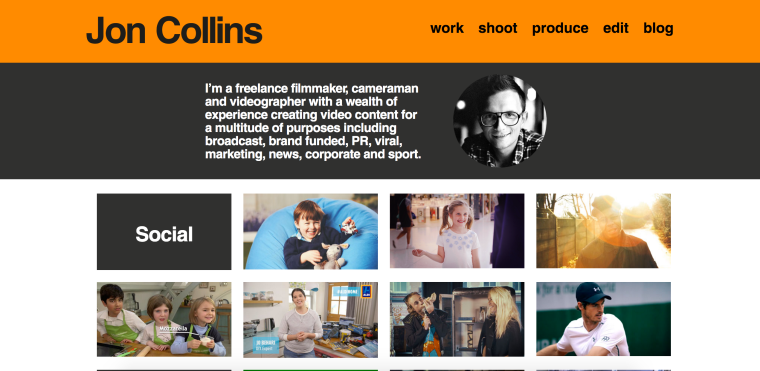
The next freelancer I came across was Jon Collins at ukjoncollins.com. I wasn’t as much of a fan of his website as I was of Charlotte’s – I found it a little over whelming and the colour scheme was quite intense. However, it reminded me a lot of one of my favourite films ‘Trainspotting’ with the muted black and orange theme. Minus the colours, the wait it is laid out is simple enough with all relevent information at the top.
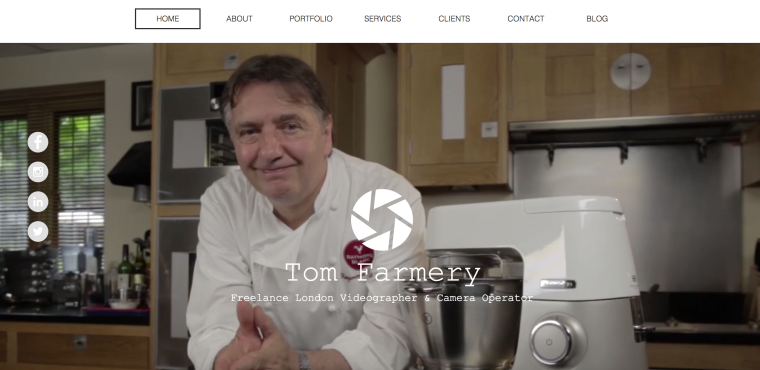
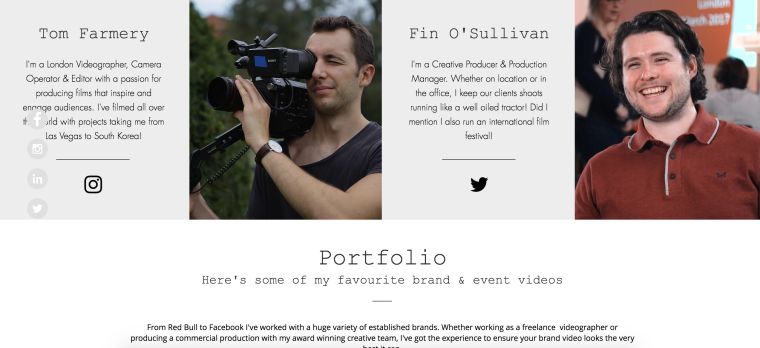
Lastly I came across freelancer Tom Farmery at tomfarmery.co.uk – I was really drawn to this theme. It felt modern and clean yet was detailed enough that it didn’t look too clinical and provided all the information a client would need. One of the things I noticed everytime I clicked onto a different persons website, they all had a distinct logo or branding for their company. Much like my own I feel like the logo has to be distinguishable to a certain extent without being confused by another logo.
WEBSITES:
Ever since studying Media I have always loved the visuals, which might be something everyone would say as it’s the thing we see first. What camera angles are being used to display an emotion, event etc. For almost every university project I have been camera assistant or Director of Photography. My inspiration stemmed from Stanley Kubrick and David Lynch – two people who have influenced my work and what I want to portray through film ever since I started studying film.
I will always remember Kubrick’s ‘One Point Perspective’ which I’ve tried to embody in some of my own work. Below is an example of his technique:
Whilst researching into the role of a camera assistant I came across a book titled ‘The Camera Assistant’s Manual’ by David E. Elkins (1991) within the first pages I discovered some of the history behind the technology used before camera’s became more complex and required individuals to learn this skill “The process of motion picture photography started when George Eastman introduced the first 35 mm film in 1889, and Thomas Edison, along with his assistant W. K. L. Dickson, designed the Kinetograph and Kinetoscope, also around 1889. Various reports indicate that the patent was applied for in 1891 but that it wasn’t granted until 1897. The Kinetograph was used to photograph motion pictures, and the Kinetoscope was used to view them. These early pieces of equipment were very basic in their design and use. As film cameras became more complex, a need developed for specially trained individuals to work with this new technology and equipment. Two of these individuals became known as the First Assistant Cameraman (1st AC) and the Second Assistant Cameraman (2nd AC).” Billy Blitzer, one of the first well known cinematographers who worked alongside Director D. W. Griffith was assigned what they would call back then, a Camera Boy, which is today’s Camera Assistant role – to simply carry the equipment and make a note of the shots for the day as there was no Script Supervisor back in 1914.
“When you start looking for that first professional job, any experience, even if it is on a student production, increases your chance of getting a job. ” It is true that getting experience on a film set whether that being a student production or a professional production it will increase the chances of landing the job in media which you desire. I found that my opportunity on a real film-set came from working with individuals who had made connections doing the same routine – working on student projects, contacting professionals and then landing experience even if it is volunteer work. There’s something very humbling and more rewarding when working on a set you have volunteered for – I found myself working extra hard to prove my worth of being there whilst on the set of ‘Sustain’.
With this in mind I decided to do a little research on how to go about applying for a role as Camera Assistant:
Intensive industry experience is the best route into this role, having gained a grounding in the basic camera skills and knowledge required. You could begin your career as a Camera Assistant, and then work your way up through the ranks of the camera department over several years.
When searching for job vacancies a lot of free-lance work was cropping up over the place as well as trainee jobs – which is inspiring to see as most people would assume media jobs are sparse. Just by searching ‘camera assistant’ into a job search website like Indeed.co.uk pages and pages of jobs were displayed under that same criteria.
“Camera Assistant (Studio And Outside Broadcast)”. Creativeskillset.org. N.p., 2017. Web. 5 Apr. 2017.
Elkins, David E. The Camera Assistant’s Manual. New York: Focal Press, 2013. Print.
For as long as I can remember, ever since I watch MTV Behind the Scenes of how music videos and films are created – I fell in love with the post production editing. I was intrigued with how someone could take raw film and turn it into something that creates a certain emotion and how special effects can alter the appearance of almost anything.
I’ve researched into editing jobs before so going back and refreshing my memory and seeing how it might of changed was exciting. I went straight to the creativeskills website as this is a reliable source for information on any media production career and the requirements needed. For an editor they are as follows:
Traditionally, you could go from being a Runner to a Trainee, Second Assistant, First Assistant and eventually to become an Editor. However, with digital editing, 2nd Assistants are now only employed on very big budget films.
As a Trainee with at least two years’ experience you would have to work as an Assistant in television or on low budget films for a considerable period of time before becoming First Assistant on feature films. Some big budget productions take on Trainees and Second Assistants, and it is important to keep up to date with films in pre-production by reading the trade press.
If you can work with an Editor as an Assistant, you may be allowed to carry out the assembly edit of some sections of the film. If you can become an experienced Assistant, you may also work as an Editor on short films, which will enable you to showcase your talents.
It’s really rather easy to become an editor from the comforts of your own home – technology has granted consumers access to a variety of editing softwares to use for their own devices without having to be hired by a large company. These prosumers are able to create anything from being multiple roles all at once, editing software now comes with every computer and smart phone device whether that be Windows Movie Maker or Final Cut Pro everyone in today’s society is an editor to some extent.
I remember when I used to create home movies and edit them on Windows Movie Maker to then show my mum pretending it was a movie premier. This passion has followed me through the last 6 years of studying media. Editing is a very delicate and time consuming process that I think a lot of people overlook. I have spent countless hours editing together a piece of work that may ultimately end up only being 3 minutes long. But that makes the process all the more beneficial and rewarding to think at the end of it all, you put that together.
An editing job is something I feel anyone can get into with practise and experience, like most things, it also doesn’t require any qualifications as the best way to learn is through shadowing others – much like I did when I shadowed the head editor at BBC Bristol a few summers a go. Editors sometimes get overlooked when being credited as everyone might see their work it’s the Director and actors who get more recognition for the piece. However, being the editor is a vital part to any film or tv show and with the exposure we have as consumers today to access editing software it’s inspiring to see more and more people learning to create amazing media content.
Balmuth, Bernard. Introduction To Film Editing. 1st ed. Boston [u.a.]: Focal Press, 1989. Print.
“Editor | Creative Skillset”. Creativeskillset.org. N.p., 2017. Web.
I’ve inserted screenshots from the emails and Facebook contact I have had with professionals in the media industry a long with feedback from the Director I worked with on the set of ‘Sustain’:
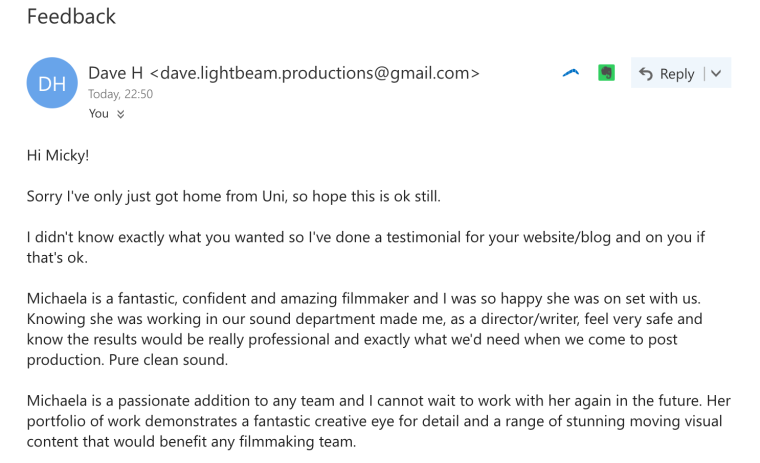
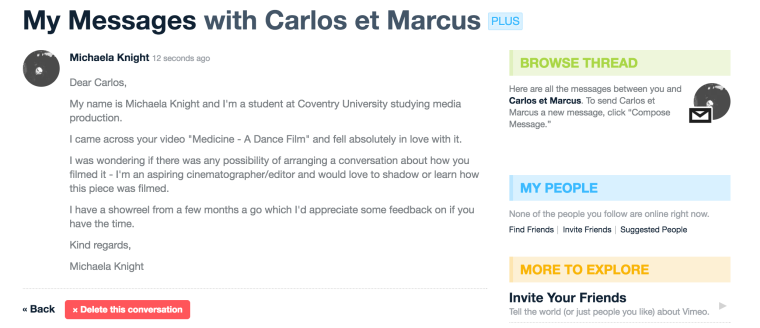
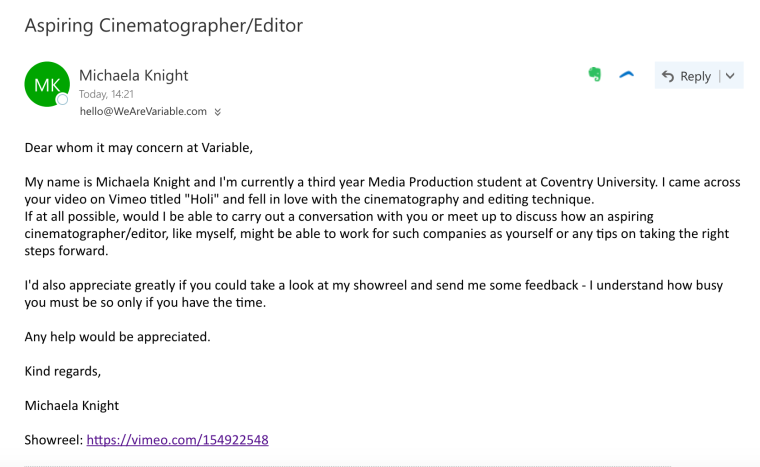
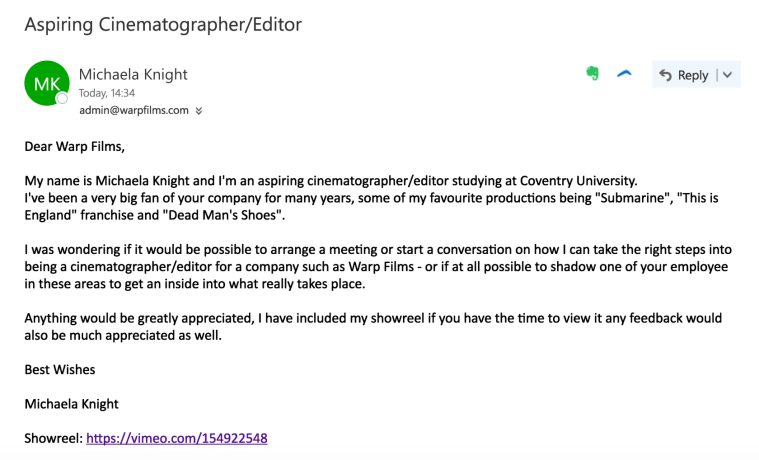
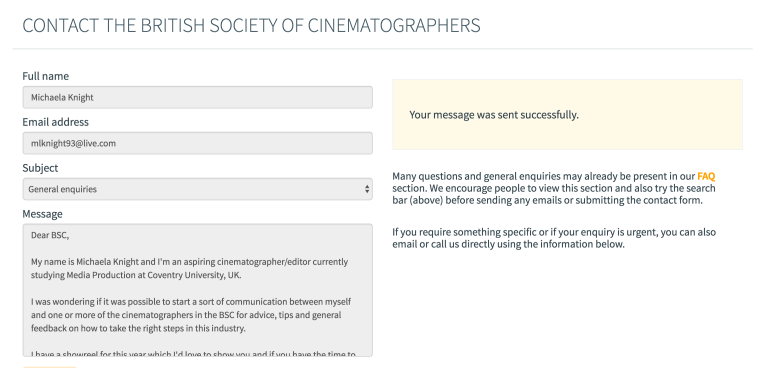
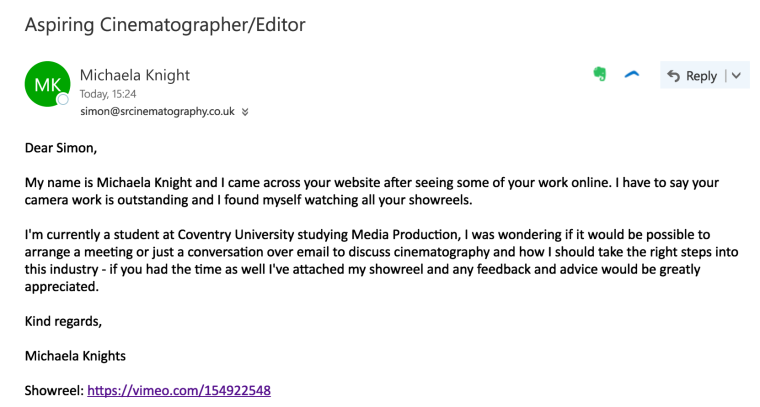
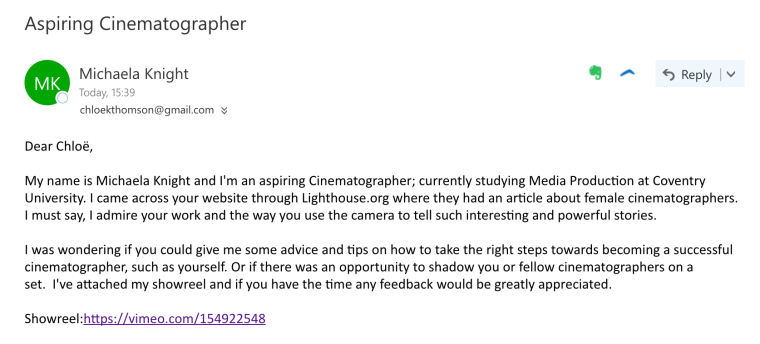
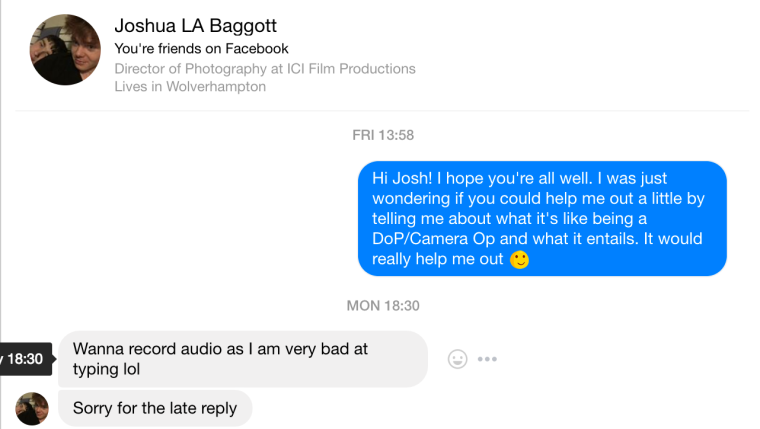
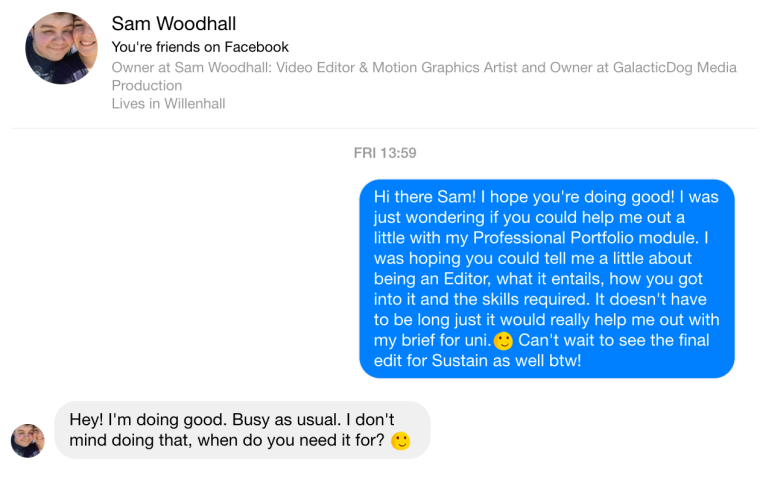
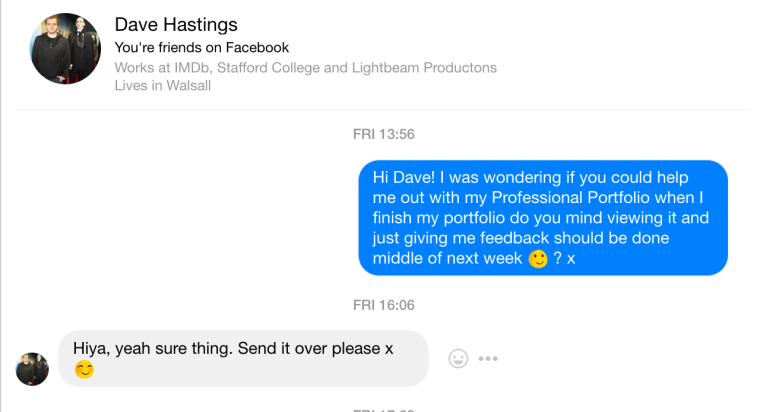
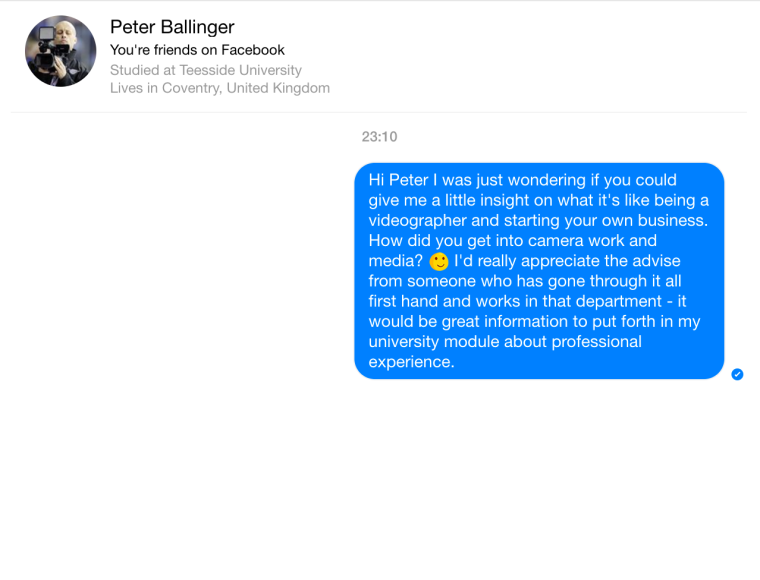
The time has finally come where we wrap up on the set of ‘Sustain’. It has been one hell of a journey and I have learnt and experienced so much more than I ever thought I would. Three months of working 24 hour weekends in all weather conditions and till late hours and I wouldn’t of had it any other way.
‘Sustain’ was my first ever time on a real film set and also as Sound Assistant, before this I had only dabbled with Sound and kept myself to camera op but I’m so glad I challenged myself with Sound as it has quickly become something I am very passionate about and would love to pursue further in my journey as a media creative.
To say that this was easy would be false, to say it was extremely fun and rewarding would be more accurate. It was one of the most difficult things I had ever put myself through but it never felt like ‘work’ – around talented, fun, encouraging and enthusiastic individuals made every day feel like we was just kids making home movies with a lot better equipment.
From this experience I have come to understand that to make a master piece you need a lot of hands and creative vision – each persons opinion and talent was put to good use and learning how each person had a certain role which would overlap into other roles was exciting to see. Often on days we would have people helping Sound who usually work as First AD or even Editor. Everyone was knowledgeable in each area which I feel confident to say I am now too. I have mingled and experienced first had what it’s like to be a DoP, Editor, Director and so on and couldn’t be more thankful for this opportunity.
I have included some photos from our shoots and I can’t wait to work with these incredible artists in the future.
During the months of January to March I was fortunate enough to get some work experience on a real film set for Birmingham Filmmakers as Sound Assistant. My main role was to operate the Boom Pole and Zoom Mic.
It was a very insightful experience, I’ve never really been sound op before as I tended to stick to camera work throughout university projects but the more I was in control of sound the more I fell in love with that role. It has opened my mind to the possibility of not just limiting myself to camera work or becoming a DoP.
A Sound Engineer makes a salary of £16,000 to £35,000 per year and works variable hours per week. There are no initial requirements to becoming a sound engineer, but some knowledge and passion for sound is essential.
The types of courses that help with experience would be music technology, sound engineering and media production. I have learnt a lot about sound throughout my three years at Coventry University and even more from being on the set of ‘Sustain’ as Sound Assistant.
The skills required for this type of career are as follows:
After working on ‘Sustain’ I feel as if these skills have enhanced for myself, I have very close attention to detail when it comes to sound and working 12 hour days has given me the ability to cope with working through being tired and deadlines.
Through more research there are many avenues a person interested in a sound career could take:
On a production sound team, your day-to-day duties may include:
On a post-production team, your duties may include:
The progression with this chosen career could start from freelance work to working for a large company or a station locally or nationally. The first steps into this role would be taking a trainee position/shadowing someone already in the industry through Creative Skillset I found a ‘Trainee Finder’ program that helps allocate people looking for experience in certain roles in the media industry by helping them with course in all locations and roles. This is something that I’m signing up to and hoping to gain after university a long side any job roles I land.
I looked into Sound Engineer roles as I felt this was crucial to understanding sound itself and how to excel in this career. Mark Linett started his sound career whilst at college by starting his own PA Company. While running the company, he began working with artists such as Seals & Crofts, Sha Na Na, and Livingston Taylor. He later than worked for Warner Bro’s Studio, although he specialises in music sound engineering and has produced many well known tracks. He was also nominated for best engineered album which he recorded and mixed for Brian Wilson who won his first solo Grammy in 2005 for “Best Rock Instrumental Performance” for “Mrs. O’Leary’s Cow” from his best-selling SMiLE album.
Whilst looking for job roles in Sound there is an abundance of opportunities, most of them located in London which is perfect for me as this is where I aim to end up. A lot of the jobs are positions for candidates with transferable skills such as this role at London Live https://www.indeed.co.uk/viewjob?jk=896888109b0d70ae&q=Sound+Operator&tk=1bci88mf491dhalb&from=web the role includes sound, camera and lighting experience.
“Looking For Film Trainees? – Trainee Finder”. Hiive. N.p., 2017. Web. 31 Mar. 2017.
“Sound Assistant”. Creativeskillset.org. N.p., 2017. Web. 31 Mar. 2017.
“Studioexpresso – Producer Mark Linett”. Studioexpresso.com. N.p., 2017. Web. 31 Mar. 2017.
“TV Or Film Sound Technician”. Nationalcareersservice.direct.gov.uk. N.p., 2017. Web. 31 Mar. 2017.